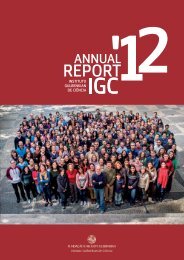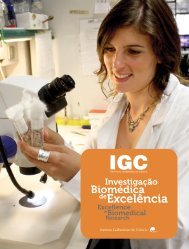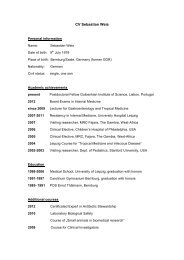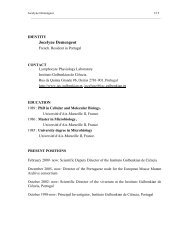organisation - the Instituto Gulbenkian de Ciência
organisation - the Instituto Gulbenkian de Ciência
organisation - the Instituto Gulbenkian de Ciência
- No tags were found...
You also want an ePaper? Increase the reach of your titles
YUMPU automatically turns print PDFs into web optimized ePapers that Google loves.
One manuscript summarizes results obtained in 2011:<br />
Fas Signalling and Macrophage-Derived HGF Induce Hepatocyte Apoptosis in<br />
Response to Plasmodium Liver Stage Infection. (Submitted).<br />
MALARIA IMMUNOGENETICS<br />
This project aims to i<strong>de</strong>ntify genetic and immunological components in clinical<br />
and asymptomatic malaria infections by interrogating human sample collections<br />
from Angola and <strong>the</strong> Island of Principe.<br />
In <strong>the</strong> Angola collection malaria cases will be compared will healthy controls and<br />
with relatives to i<strong>de</strong>ntify genetic variants controlling different clinical forms of<br />
severe malaria. The Island of Principe covers approximately 142 square kilometres<br />
with only about 6000 inhabitants and little emigration. We collected<br />
samples from a total of 1867 healthy individuals in 10 different localities in<br />
Principe in <strong>the</strong> years 2004, 2005 and 2008. This may represent one of <strong>the</strong> very<br />
few examples of a whole-population based study in malaria. We found out that<br />
in 2005, while <strong>the</strong> disease coursed at <strong>the</strong> mesoen<strong>de</strong>mic level, 20% of <strong>the</strong> apparently<br />
healthy individuals were infected with Plasmodium. We aim to use this<br />
collection to i<strong>de</strong>ntify genetic factors that are <strong>de</strong>termining <strong>the</strong> non-symptomatic<br />
carrier status.<br />
One manuscript summarizes results obtained in 2011:<br />
Involvement of IFNAR1 in cerebral malaria reveals a pathogenesis mechanism<br />
<strong>de</strong>pen<strong>de</strong>nt on CD8+ cells (Submitted).<br />
B1 CELLS AND NATURAL ANTIBODIES IN TYPE 1 DIABETES (T1D) PATHOGENESIS<br />
Type-1 diabetes (T1D) is generally known as a T-cell mediated autoimmune disease<br />
where <strong>the</strong> pancreatic β-cells are <strong>de</strong>stroyed and insulin secretion abrogated.<br />
Yet, B lymphocytes were proven necessary in disease pathogenesis and<br />
<strong>the</strong> <strong>de</strong>tection of autoantibodies to Beta-cell antigens are one of <strong>the</strong> earliest indicators<br />
of disease. We propose that autoreactive natural antibodies (NAbs) act<br />
as effector molecules that fuel <strong>the</strong> autoimmune process through complement<br />
system activation, increased antigen presentation to T cells and/or autoreactive<br />
B cell proliferation in <strong>the</strong> pancreatic lymph no<strong>de</strong>s. By exploring on one hand <strong>the</strong><br />
involvement of B1 cells and in particular autoreactive NAbs in T1D pathogenesis<br />
and on <strong>the</strong> o<strong>the</strong>r hand <strong>the</strong> genetic factors <strong>de</strong>termining <strong>the</strong> dysfunctions in this<br />
cell compartment, we will be able to uncover <strong>the</strong> missing links. This project will<br />
elucidate mechanisms that link early B1 cell <strong>de</strong>velopment to autoantibody secretion<br />
and to T1D pathogenesis in murine and human disease.<br />
IGC ANNUAL REPORT ‘11<br />
RESEARCH GROUPS<br />
56






